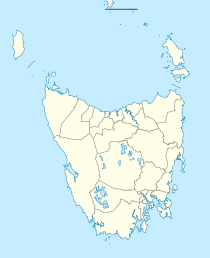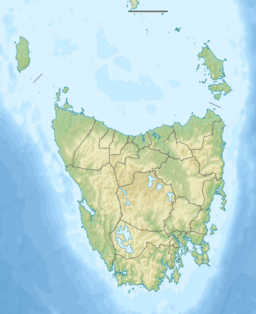Lake Leake, Tasmania facts for kids
Quick facts for kids Lake LeakeTasmania |
|
|---|---|
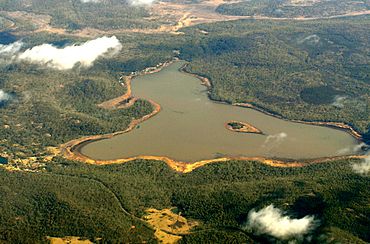
Aerial photo from the east of Lake Leake (kunawi) showing Rawlinna Village (Kalangadoo) at the left of the lake
|
|
| Population | 176 (2006 census) |
| Postcode(s) | 7210 |
| LGA(s) | Northern Midlands Council (53%), Glamorgan-Spring Bay Council (47%) |
| State electorate(s) | Lyons |
| Federal Division(s) | Lyons |
Lake Leake (called kunawi in palawa kani, the language of the Aboriginal Tasmanians) is a special place in eastern Tasmania. It's both a man-made lake and a small township (a tiny town).
The area around Lake Leake is managed by two different local councils:
- Northern Midlands Council looks after 53% of it.
- Glamorgan-Spring Bay Council looks after 47% of it.
This lake is very big! It can hold about 22 billion litres of water. That's enough to fill many, many swimming pools! The lake was named after Charles Henry Leake, who was an important person in Tasmania's government a long time ago. In 2006, about 176 people lived in the Lake Leake area.
What Makes Lake Leake Special?
| Lake Leake | |
|---|---|
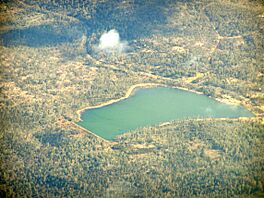
Lake Yaleena, south of Lake Leake
|
|
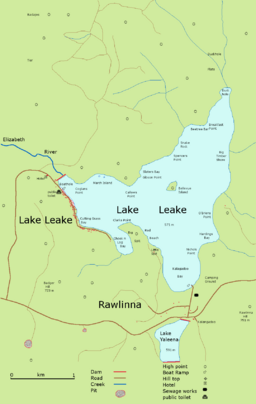 |
|
| Location | Tasmania |
| Coordinates | 42°0′30″S 147°49′30″E / 42.00833°S 147.82500°E |
| Type | Reservoir |
| Basin countries | Australia |
| Water volume | 22.076 gigalitres (779,600,000 cu ft) |
Lake Leake is a popular spot for fishing. People come here to catch different kinds of trout, like brook trout, brown trout, and rainbow trout.
The small village next to the lake is mainly for people who love to fish. The land belongs to the Northern Midlands Council. If you want to have a building there, you need to buy a special permit. There are also rules about how many days a year you can stay there. This helps keep the area special for anglers.
South of Lake Leake, you'll find another lake called Lake Yaleena. This lake was built by a private company just for fishing. It even has cabins where people can stay overnight.
History of Lake Leake
Long ago, before Europeans arrived, the land around Lake Leake was home to the Peenrymairmemener clan. They were part of the North Midlands nation of Aboriginal Tasmanians. This area was originally a natural wetland with many lagoons. The Aboriginal people called it kunawi.
Early European explorers described it as a "resort of the natives." This means it was a very important meeting place for Aboriginal people. They found several Aboriginal huts there. The area also has ancient Aboriginal tools and a quarry where they made stone tools.
Later, European settlers renamed the area "Kearney's Bogs" before it became Lake Leake. The idea to build a dam here was discussed for a long time. Finally, a 5-metre-high dam was finished in 1884. This created the large lake we see today.
At first, the lake could hold about 19.9 million cubic metres of water. It covered an area of about 6 square kilometres. In 1971, the dam was made a little taller to hold even more water. Water from the lake is used to water crops (this is called irrigation). It also helps keep the lake full for fishing. Lake Leake is usually at least half full, so there's always plenty of water for fish!
Weather at Lake Leake
The weather at Lake Leake changes throughout the year. It can get quite warm in summer and very cold in winter.
Here's a quick look at the average temperatures and rainfall:
- Warmest Month: January, with an average high of 19.8°C.
- Coldest Month: July, with an average high of 8.6°C.
- Rainiest Month: August, with about 86.5 mm of rain.
- Sunniest Month: January, with lots of sunshine.
It's important to remember that these are just averages. The actual weather can be different each day!
 | Shirley Ann Jackson |
 | Garett Morgan |
 | J. Ernest Wilkins Jr. |
 | Elijah McCoy |


